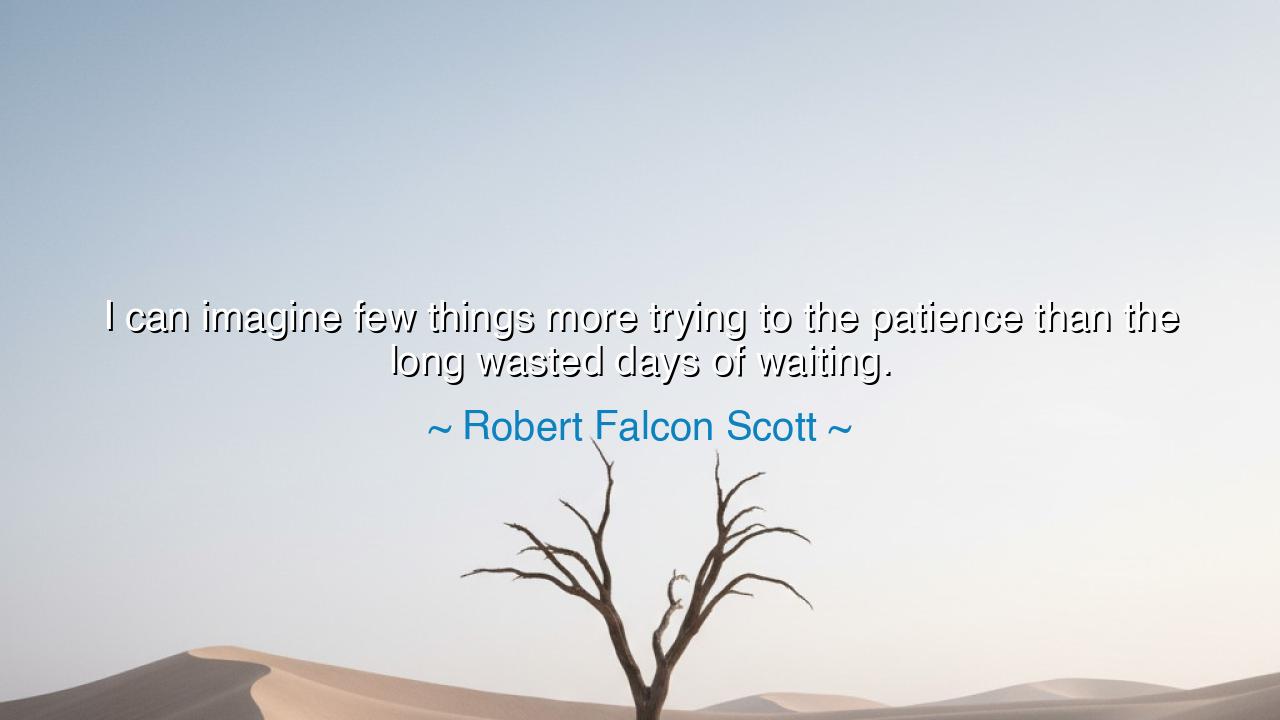
I can imagine few things more trying to the patience than the
I can imagine few things more trying to the patience than the long wasted days of waiting.






“I can imagine few things more trying to the patience than the long wasted days of waiting.” Thus wrote Robert Falcon Scott, the noble explorer who braved the white desolation of the Antarctic, and whose final words became a hymn to endurance. In this quiet yet profound reflection, Scott reveals the deepest trial of the human spirit — not the hardship of the storm, nor the agony of the cold, but the suffering of waiting. For to wait without action, to feel time slip like sand through unmoving fingers, is to confront the shadow of helplessness itself.
The origin of this quote lies within the heart of Scott’s final expedition — his doomed journey to the South Pole in 1911–1912. He and his companions, driven by courage and national pride, endured unimaginable hardship: frostbite, hunger, exhaustion. Yet in his journals, amid the biting winds and endless snow, Scott wrote not only of physical pain, but of the torment of waiting — of days trapped in tents by blizzards, powerless to advance, forced to watch their strength fade while time crept forward with cruel indifference. In those moments, when action was impossible, patience became the fiercest battle of all. His words are not complaint, but confession — the understanding that sometimes the hardest struggle is not against nature, but against one’s own restless heart.
To the ancients, this lesson was well known. The philosopher Seneca wrote that “waiting is the greatest teacher of the soul, for it demands both humility and strength.” When man cannot move forward, he must turn inward. In those still hours of suspension, the impatient spirit screams for progress, for control, for escape — but the wise learn that waiting is itself a crucible. It tempers the heart as fire tempers steel. Yet, as Scott reminds us, such waiting is no easy virtue; it grinds against the will, tests the courage of the mind, and reveals the truth of one’s endurance.
The story of Ernest Shackleton, Scott’s fellow explorer, echoes this truth. Trapped in the ice of the Weddell Sea, Shackleton and his men waited months upon months for the chance to break free. Their ship, Endurance, was crushed and lost; they were stranded on drifting ice, isolated from the world. Yet in that long waiting, Shackleton’s greatness emerged. He kept his men’s spirits alive through games, humor, and discipline, transforming idleness into purpose. His leadership turned despair into patience, and patience into salvation. Where Scott’s words lament the agony of waiting, Shackleton’s actions reveal its mastery. One suffered through the stillness; the other conquered it. Both teach the same eternal truth — that waiting is not weakness, but a field where character is proven.
Scott’s reflection, however, carries a deeper sorrow, for he was not merely waiting for rescue or weather — he was waiting for fate itself. His words capture the essence of every human being who has stood powerless before life’s delays: the soldier awaiting news from home, the lover awaiting return, the dreamer awaiting opportunity. To wait is to live suspended between hope and despair. It is to feel time as both ally and enemy — too slow to deliver, yet too swift in its passing. Thus, Scott’s “long wasted days” are not wasted in truth; they are days in which the soul wrestles with the eternal question — how to endure what cannot yet be changed.
The lesson of this quote is not despair, but awakening. For though waiting may seem wasted, it is in those hours that patience becomes wisdom and endurance becomes strength. The restless heart must learn to trust that stillness is not emptiness, but preparation — that what grows in silence may one day bear the fruit of action. The one who can endure waiting without surrender becomes unbreakable. The one who fills the waiting with reflection, preparation, or quiet faith transforms suffering into growth.
So, dear listener, when you too find yourself in the long wasted days of waiting, remember Scott and his frozen tent beneath the endless Antarctic sky. Remember that even as time seems idle, life still breathes beneath the surface of your stillness. Use those hours to build your patience, to sharpen your mind, to strengthen your resolve. For action may be delayed, but readiness need not be. When the winds of opportunity return — as they always do — those who have endured their waiting in wisdom will rise not weary, but renewed. Thus, as Scott’s final words echo through history, let them not speak only of sorrow, but of the eternal strength found in the patience of waiting.






AAdministratorAdministrator
Welcome, honored guests. Please leave a comment, we will respond soon